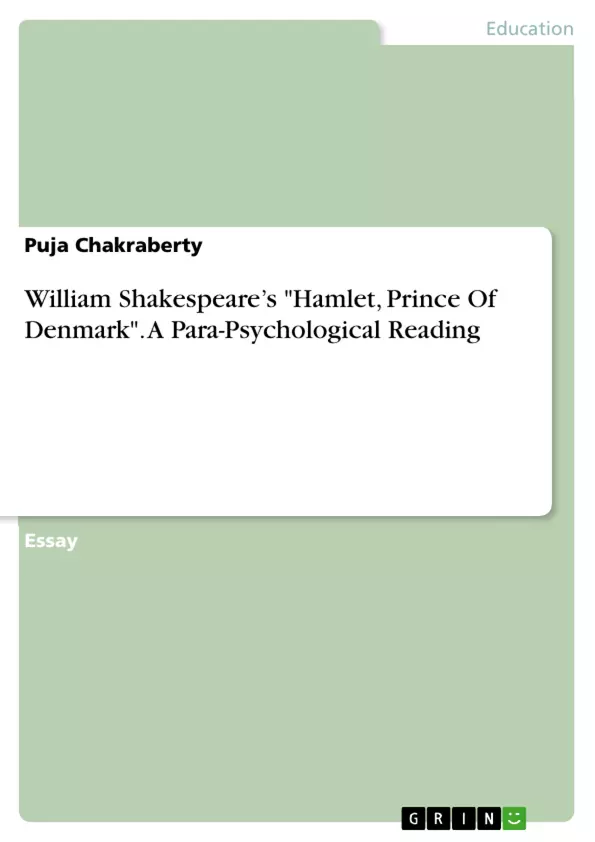The present paper endeavours to give an in depth para-psychological reading of William Shakespeare’s classic play ‘Hamlet, Prince Of Denmark’. Two distinguished terminologies, “interoception” and “exteroception” are introduced and taken into consideration, while examining the central character, Prince Hamlet. Previous theories and critical observations are also analysed for a proper assessment of the play. Besides, it is also shown how a careful para-psychological reading can provide an antidote to all previous critical excesses. Critics have often looked upon the play as a potential “Pandora’s box of troubles” interpreting it in a distinctive variety of spectrums. However, the following research shall show how the play is Shakespeare’s systematic study and a tribute to the superior intellect of man.
Inhaltsverzeichnis (Table of Contents)
- Abstract
- Introduction
- Text
- Conclusion
Zielsetzung und Themenschwerpunkte (Objectives and Key Themes)
This paper aims to provide a para-psychological reading of Shakespeare's Hamlet, focusing on the interplay between "interoception" (internal sensitivity) and "exteroception" (external sensitivity) within Hamlet's character. It critiques previous interpretations, arguing that they overlook crucial psychological dimensions.
- Para-psychological interpretation of Hamlet
- Critique of existing critical interpretations of Hamlet (Freud, Eliot, Goethe, Coleridge)
- The significance of interoception and exteroception in understanding Hamlet's actions and inaction
- Hamlet's moral struggle and the conflict between internal and external pressures
- Hamlet's ultimate triumph over adversity
Zusammenfassung der Kapitel (Chapter Summaries)
Abstract: This abstract introduces the paper's goal: a para-psychological reading of Hamlet utilizing the concepts of interoception and exteroception to analyze Prince Hamlet's character. It highlights the critique of previous critical interpretations, suggesting the paper offers a new perspective. The abstract also emphasizes the play as a testament to human intellect.
Introduction: The introduction sets the stage by quoting Hamlet's famous self-reflection on humanity. It introduces the key psychological terms, interoception and exteroception, emphasizing their importance in maintaining human equilibrium. It also foreshadows a critique of previous interpretations of Hamlet, pointing out their limitations and inconsistencies, ultimately suggesting that a para-psychological approach is necessary for a complete understanding of the play.
Text: This section thoroughly analyzes several prominent critical interpretations of Hamlet, beginning with Freud's Oedipus complex theory and its development by Ernest Jones. It critiques these theories for oversimplifying Hamlet's motivations and neglecting other essential aspects of the play. It then assesses T.S. Eliot's focus on form over content, and Goethe's sentimental interpretation, highlighting the shortcomings of both. Finally, it discusses Coleridge's insightful but ultimately incomplete analysis, which recognizes the importance of "sense" and "sensibility" but fails to fully explain Hamlet's actions. This section sets the groundwork for the paper's own interpretation by demonstrating the limitations of previous approaches.
Schlüsselwörter (Keywords)
Para-psychology, Hamlet, interoception, exteroception, Oedipus complex, critical analysis, Shakespeare, tragedy, moral struggle, virtue, action, inaction.
Frequently Asked Questions about: A Para-Psychological Reading of Hamlet
What is the main focus of this academic paper?
This paper offers a para-psychological interpretation of Shakespeare's Hamlet. It uses the concepts of interoception (internal sensitivity) and exteroception (external sensitivity) to analyze Hamlet's character and actions, providing a new perspective on the play.
What are interoception and exteroception, and how are they relevant to the paper?
Interoception refers to internal sensitivity, while exteroception refers to external sensitivity. The paper argues that understanding the interplay between these two concepts is crucial to interpreting Hamlet's psychological state and motivations, particularly his famous indecisiveness and moral struggles.
Which previous interpretations of Hamlet does the paper critique?
The paper critiques several well-known interpretations of Hamlet, including those by Freud (Oedipus complex), Ernest Jones (further development of Freud's ideas), T.S. Eliot (focus on form), Goethe (sentimental interpretation), and Coleridge (focus on "sense" and "sensibility"). It argues that these interpretations are incomplete or oversimplified.
What are the key themes explored in the paper?
Key themes include a para-psychological interpretation of Hamlet, a critique of existing critical interpretations, the significance of interoception and exteroception in understanding Hamlet's behavior, Hamlet's moral struggle and the conflict between internal and external pressures, and ultimately, Hamlet's triumph over adversity.
What is the structure of the paper?
The paper includes an abstract, introduction, a main section analyzing Hamlet, and a conclusion. The main section thoroughly examines and critiques existing interpretations before presenting its own para-psychological analysis.
What are the key takeaways or conclusions of the paper?
The paper concludes that a para-psychological approach, considering interoception and exteroception, is necessary for a complete understanding of Hamlet's character and the play's complexities. It suggests that previous interpretations have overlooked crucial psychological dimensions.
What are the keywords associated with this paper?
Key words include: Para-psychology, Hamlet, interoception, exteroception, Oedipus complex, critical analysis, Shakespeare, tragedy, moral struggle, virtue, action, inaction.
What is the overall purpose or aim of this research?
The paper aims to offer a fresh, insightful para-psychological reading of Hamlet, enriching the existing body of critical work on the play and suggesting a new framework for interpretation.
- Quote paper
- Puja Chakraberty (Author), 2014, William Shakespeare’s "Hamlet, Prince Of Denmark". A Para-Psychological Reading, Munich, GRIN Verlag, https://www.grin.com/document/278664



